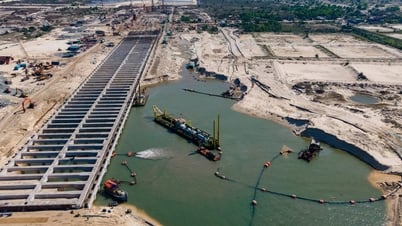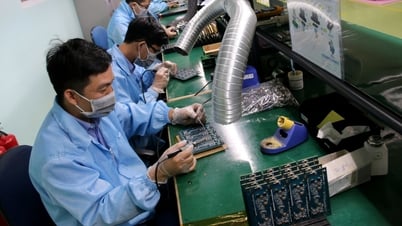
Vietnam's tourism industry is largely privately run and has contributed greatly to economic growth. In the photo: Thai tourists visiting Hue - Photo: Q. DINH
Previously, General Secretary To Lam also gave a speech requesting the Government to innovate management methods and build an administrative system geared towards serving people and businesses.
Because if we do not change our management mindset and create conditions for the private sector to develop, we will not be able to fully exploit the available growth potential and the target of double-digit GDP growth will be difficult to achieve.
"Rethinking" the entire system
The "management" mindset over the past decades has laid the foundation for the operating mechanism of the state apparatus. Management means controlling, operating, making regulations, building procedures and enforcing the law.
However, in the process, the rigidity of management thinking has caused many administrative agencies to become stagnant, lack flexibility and respond slowly to reality, especially in the context of a dynamic and integrated market economy.
This process is a repositioning of the role of the State, from manager to servant. The government must consider businesses and people as objects that need support and companionship, instead of simply controlling and handling violations.
A civil servant who knows how to put himself in the position of businesses to understand the barriers they face, and then proactively remove them, that is "service". We cannot wait until businesses "call for help" before taking action.
Managers must "prevent" problems, anticipate risks, and resolve them with initiative and understanding.
This requires a profound transformation from mindset to institutions. Once mindsets have changed, institutions and laws must also be redesigned to facilitate new ways of doing things.
New thinking operating on old mechanisms will only lead to conflicts and even be counterproductive. It is necessary to review the entire legal system, from organizational structure, decentralization, to approval, disbursement, inspection, and supervision processes...
We need to reconsider an important mindset that the private economy is not just a part of the economy, but the main driving force, the "subject of development". The Central Resolution has clearly identified the private economy as an important driving force.
The General Secretary also emphasized the spirit of innovation in thinking that the State is no longer a "manager" in the old way, but must transform into a "servant", to create an environment, accompany and remove barriers.
We cannot expect businesses to "transform" if the management apparatus remains stagnant. We also cannot demand results if the "management" mindset still overwhelms the "service" spirit.
Is tourism a hotbed of innovation?
The tourism industry is a typical example. Of all economic sectors, tourism is one of the sectors with the highest rate of private enterprise participation.
This is also the industry that is most directly affected and sensitive to the State's policies. If the shift from management to service thinking is well implemented, the tourism industry will be the place where the effectiveness of the new policy is clearly demonstrated.
The ownership structure in the tourism industry is quite unique as over 96% of activities in the industry are undertaken by the private sector.
Apart from the two major tourism corporations in Hanoi and Ho Chi Minh City that are still state-owned, the rest of the entire industry - from accommodation, travel, transportation, to food and entertainment services - are all undertaken by the private sector.
This sector has brought in huge revenue, creating jobs for about 6.3 million workers, expected to increase to 7 million people next year.
This shows the fact that the private sector in the tourism industry is not only the driving force for growth, but also the real pillar of the entire industry.
In 2025, total social investment capital is expected to reach 174 billion USD, of which the private economy contributes 96 billion USD compared to foreign direct investment (FDI) of about 28 billion USD, and state investment of about 36 billion USD, according to the General Statistics Office.
With this structure, if public investment is not allocated effectively to "activate" areas with spillover effects such as tourism, it is easy to fall into a situation of "inherent but ineffective".
If Vietnam wants to achieve its strong growth target in the next decade, identifying the right drivers and allocating resources appropriately is a prerequisite.
The tourism sector, with its dominant private sector structure, high employment potential and direct contribution to GDP, should be placed at the centre of development strategies, especially in transport infrastructure, destination planning and promotion.
And above all, it is time for us to not only "talk" about the private sector as the driving force, but to actually take action to give them a commensurate position and role in national development.
Infrastructure, a transparent legal system, and planning updated according to actual needs are essential factors for the tourism industry to make a breakthrough.
But more importantly, the spirit of companionship and service from management agencies to quickly resolve problems, proactively support businesses, and consider business development as the success of the government.
Source: https://tuoitre.vn/co-bo-may-phung-su-doanh-nghiep-tu-nhan-se-chuyen-minh-20250509003822524.htm


![[Photo] Prime Minister Pham Minh Chinh attends the groundbreaking ceremony of Trump International Hung Yen Project](https://vphoto.vietnam.vn/thumb/1200x675/vietnam/resource/IMAGE/2025/5/21/ca84b87a74da4cddb2992a86966284cf)


![[Photo] Determining the pairs in the team semi-finals of the National Table Tennis Championship of Nhan Dan Newspaper](https://vphoto.vietnam.vn/thumb/1200x675/vietnam/resource/IMAGE/2025/5/21/eacbf7ae6a59497e9ae5da8e63d227bf)
![[Photo] Prime Minister Pham Minh Chinh receives Rabbi Yoav Ben Tzur, Israeli Minister of Labor](https://vphoto.vietnam.vn/thumb/1200x675/vietnam/resource/IMAGE/2025/5/21/511bf6664512413ca5a275cbf3fb2f65)
![[Photo] Scientific workshop "Building a socialist model associated with socialist people in Hai Phong city in the period of 2025-2030 and the following years"](https://vphoto.vietnam.vn/thumb/1200x675/vietnam/resource/IMAGE/2025/5/21/5098e06c813243b1bf5670f9dc20ad0a)























































































Comment (0)